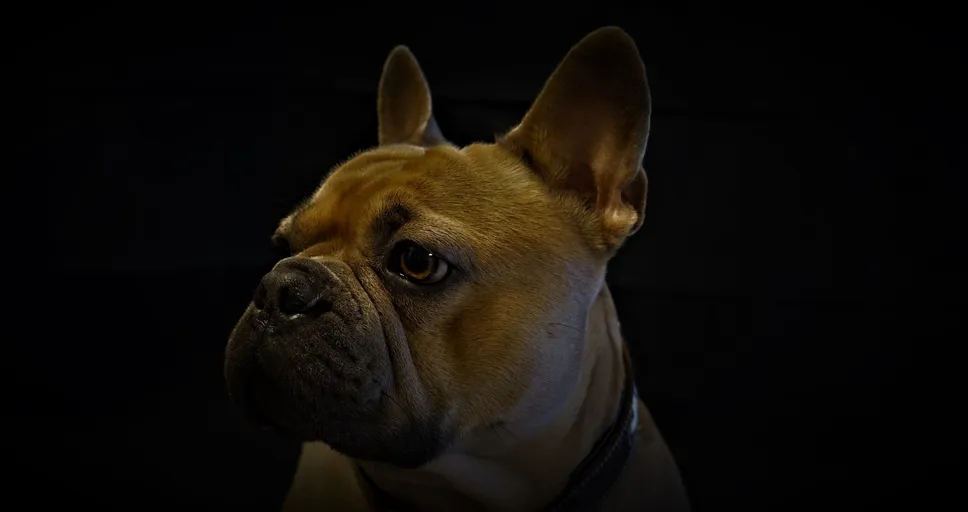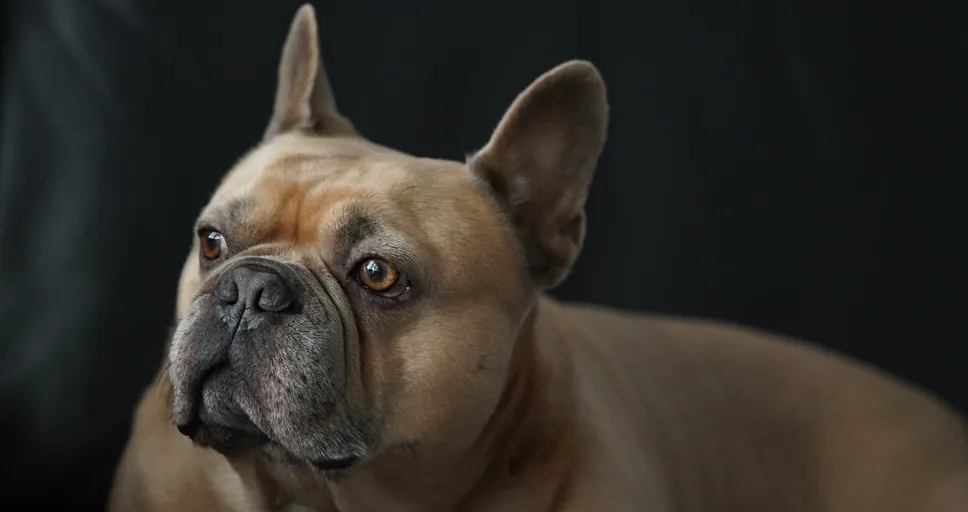Ever asked yourself, “do French Bulldogs have breathing problems?” Well, you’re not alone in this curious quest. French Bulldogs, with their squishy faces and compact bodies, are the epitome of canine charm. But, let’s dive into the health side of things, shall we?
French Bulldogs are adorable, no doubt, but their unique physical features come with a set of challenges. Before we explore the depths of their breathing dilemmas, let’s get a general health check-up. These little guys, while sturdy and companionable, have a genetic predisposition that can affect their health—especially their breathing.
Their short snouts and distinct facial structure, while undeniably cute, are actually the crux of the matter when it comes to their respiratory health. But don’t fret just yet! Understanding the overall health of a French Bulldog is the first step to ensuring they lead a comfortable, happy life. And hey, knowledge is power, especially when it comes to caring for our squishy-faced friends.
- French Bulldogs often face breathing issues due to their brachycephalic (short-headed) structure.
- Not all French Bulldogs will experience severe problems, but awareness is crucial.
- Look out for signs of breathing difficulty, such as loud breathing or quick fatigue.
- Early veterinary care can significantly improve quality of life.
- Regular health checks and adapted exercises are essential.
- Be mindful during hot weather and ensure they can breathe comfortably.
- Understanding and managing Brachycephalic Syndrome can help your Frenchie lead a happy, active life.
Table of Contents
- 1 Do French Bulldogs Have Breathing Problems?
- 2 Understanding Brachycephalic Syndrome
- 3 Common Respiratory Issues in French Bulldogs
- 4 Symptoms to Watch For
- 5 Diagnosis and Treatment Options
- 6 Improving Your French Bulldog’s Breathing
- 7 Prevention and Care Tips
- 8 Frequently Asked Questions
- 8.1 What are common breathing problems in French Bulldogs?
- 8.2 When should I be concerned about my French Bulldog breathing?
- 8.3 How do I know my French Bulldog is dying?
- 8.4 What is the leading cause of death in French Bulldogs?
- 8.5 How long does a Frenchie live?
- 8.6 How can I help my French bulldog breathe better?
- 8.7 How do I know if my French bulldog has breathing problems?
- 8.8 Why is my French bulldog struggling to breathe?
- 8.9 What is the life expectancy of a French Bulldog?
- 8.10 Why do Frenchies have so many health problems?
- 8.11 Do Frenchies have health problems?
- 9 Conclusion: Breathing Health in French Bulldogs
- 10 Recommended Authors For Further Reading
Do French Bulldogs Have Breathing Problems?
So, after setting the scene with our introduction, we’ve landed on the million-dollar question: do French Bulldogs have breathing problems? Imagine this as the part where we dive deep, not into the scary abyss of the internet’s worst pet forums, but into a well-lit, factual, and somewhat whimsical discussion.
Let’s kick things off with a bit of truth – yes, our squishy-faced friends can have their share of huffing and puffing. It’s not just because they’re overly excited about their next meal or that they’ve seen a squirrel. Their distinctive, adorable faces, which make them look perpetually young and slightly bewildered, are part of the reason.
These pups belong to a group known as ‘brachycephalic breeds’. Fancy term, right? It basically means ‘short head’, which is adorable but also a bit problematic. The same trait that gives them those irresistible faces can lead to narrowed airways, making a simple activity like breathing a bit more laborious than it should be.
Now, before you start picturing all French Bulldogs with tiny oxygen masks and mini treadmills, it’s not all doom and gloom. Not every French Bulldog will experience severe breathing problems. Like humans, each dog is an individual; some may sprint around with the zest of a thousand greyhounds, while others might get winded checking the mailbox. It’s a spectrum.
But, it’s important to be aware. Recognizing the signs early can make a world of difference. If your Frenchie is sounding more like a vintage vacuum cleaner than a dog, it might be time for a vet visit. It’s all about maintaining that balance between their irresistible charm and their health needs.
And let’s be clear, this isn’t about painting a bleak picture. It’s about love, folks. The love we have for these little creatures, with their eyes that could melt the coldest of hearts and snorts that could, well, honestly, sometimes clear a room. It’s this love that drives us to ensure they breathe as comfortably as they’ve settled into our lives and hearts.
Remember, knowledge is power – or in this case, the power to give your Frenchie the best life, filled with all the snuggles, treats, and, most importantly, breaths they deserve. So, while the answer is yes, do not despair. With proper care and vigilance, your Frenchie can live a full, vibrant life, snorts and all.
Understanding Brachycephalic Syndrome
So, we’ve been chatting about whether our beloved French Bulldogs face breathing issues, diving into the “do French Bulldogs have breathing problems” pool. It’s time to get a bit nerdy, but don’t worry, we’ll keep it fun – think of this as the cool science class you always wanted.
Brachycephalic Syndrome might sound like the title of a sci-fi movie, but it’s actually a real thing that affects our short-snouted pals. The term ‘brachycephalic’ comes from Greek words meaning ‘short’ and ‘head’. So, if your Frenchie’s face looks like it’s been adorably smushed, congratulations, you have a brachycephalic star!
But why does this make breathing a challenge? Imagine trying to breathe through a straw while running a marathon. Sounds tough, right? Well, that’s a day in the life of a brachycephalic dog. Their unique anatomy includes narrow nostrils, elongated soft palates, and sometimes everted laryngeal saccules (yeah, it’s a mouthful), all contributing to the not-so-fun breathing extravaganza.
But wait, there’s more! These characteristics don’t just affect their breathing; they can influence their overall health. Activities that should be a walk in the park (literally) can become a Herculean task. And while we love them for their snorts and snores, it’s these very sounds that hint at the challenges they face.
Now, I hear you asking, “So, what does this mean for my Frenchie?” First, it’s not all bad news. Awareness is your best friend here. Recognizing that your dog is not just quirky but actually part of a special group with specific needs is the first step to providing them with a better quality of life.
It’s like being part of a secret club, but instead of secret handshakes, there are health checks and special considerations during exercise and hot weather. Understanding Brachycephalic Syndrome means you can be the superhero your Frenchie needs, equipped with the knowledge to protect them from their own anatomy.
So, in wrapping up this nerdy journey, remember that while the question “do French Bulldogs have breathing problems” might lead us down a path filled with medical terms and concerns, it also opens up a world of care, love, and attention that can make all the difference. And who knows? With the right care, your Frenchie could be the next canine influencer, showing off not just their cute face but their incredible resilience.
Common Respiratory Issues in French Bulldogs

Alright, folks, we’ve already tackled the big question: do French bulldogs have breathing problems? And dived into the world of Brachycephalic Syndrome with the enthusiasm of a Frenchie seeing a squirrel. Now, let’s march further into the jungle of knowledge and uncover the common respiratory issues that these adorable snort-machines face.
First up, let’s talk about something called stenotic nares. Sounds like a spell from Harry Potter, right? But actually, it’s a condition where the nostrils are narrower than usual, making it a tad harder for our bulldog pals to take in air. Picture trying to run a marathon while breathing through a coffee stirrer. Not the dream, right?
Next on the list is the elongated soft palate. This is a classic for the squish-faced brigade. Essentially, it’s a piece of tissue in the throat that’s a bit too long for their compact faces, which can flop down and block the airway. Imagine trying to sing an opera with a marshmallow stuck in your throat – that’s the kind of inconvenience we’re talking about here.
And then there’s something called tracheal collapse – a condition that sounds as fun as a flat tire on a road trip. This is where the trachea, or windpipe, isn’t as sturdy as it should be, leading to a range of breathing difficulties. If your Frenchie sounds like a 1950s vacuum cleaner or a goose honking, it might be time to chat with your vet.
Now, let’s sprinkle in a dash of laryngeal collapse, a condition that could follow chronic airway obstruction. It’s like the sequel nobody asked for but gets anyway. It’s where parts of the airway collapse and make breathing even more of a challenge, turning every breath into a Herculean effort.
“But wait,” I hear you say, “is it all just doom and gloom?” Absolutely not! Awareness is the first step towards action. By knowing these common issues, you’re better equipped to spot the signs early and hop to it.
Remember, while our little Frenchies might not be the marathon runners of the dog world, with the right care, they can live full and happy lives. And sure, while the question “do French bulldogs have breathing problems” might seem like a cloud hanging over these little bundles of joy, with knowledge, love, and the right care, the sun can shine right through, turning every wheeze into a breeze – metaphorically speaking, of course.
Symptoms to Watch For
By now, you might be pondering the perennial question, “do French Bulldogs have breathing problems?” like it’s the new “what’s the meaning of life?” But before we get too existential, let’s zoom in on the symptoms to keep an eye on. After all, being the best pet parent is all about understanding and vigilance—kind of like being a detective, but cuter.
First off, let’s talk snoring. We’re not talking about the cute, little puffs of air they might emit while dreaming of chasing squirrels. No, we’re diving into the loud, can’t-sleep-through-this-even-if-you-tried kind. While a little snore here and there is nothing to worry about, consistent heavy snoring might be a sign that your Frenchie is struggling to breathe properly.
Next on our symptom watchlist is something called labored breathing. This isn’t the heavy panting they do after a spirited session of fetch. This is more, “I just climbed Mount Everest in record time, and I’m not a mountain climber.” If you notice your dog working harder than usual to breathe, even at rest, it’s time to perk up those ears and pay attention.
And then there’s the dreaded blue tint. No, your dog hasn’t turned into a smurf. If you notice a bluish tint to their gums or tongue, it’s a sign that they’re not getting enough oxygen. This is serious and warrants an immediate trip to the vet—like, drop everything and go.
Let’s not forget about fainting. If your Frenchie takes a tumble and it’s not because they’re imitating their favorite soap opera character, it could be due to lack of oxygen. This is as serious as a cliffhanger episode and requires urgent veterinary attention.
Gagging or retching, especially after meals or during exercise, is another red flag. It’s like their body is saying, “Hey, something’s not right here!” and it’s your cue to listen closely.
“But wait,” you say, “how do I keep my cool when spotting these symptoms?” First off, stay calm. You’re the Watson to your Frenchie’s Sherlock. Keeping a cool head helps you make better decisions. Document what you observe and share it with your vet. They’re like the Dumbledore of pet health, offering wisdom and guidance in your time of need.
Remember, asking “do French Bulldogs have breathing problems” is just the start. Recognizing the signs, staying informed, and acting swiftly is the real hero’s journey. Your Frenchie relies on you, and armed with this knowledge, you’re more than up to the task. Keep those eyes peeled and that love flowing; together, you’ve got this!
Diagnosis and Treatment Options

So, we’ve been on quite the journey, exploring the ins and outs of the question, “do French Bulldogs have breathing problems?” Now, it’s time to shift our focus from identifying the issue to tackling it head-on, like a detective who’s finally found the clue they’ve been searching for. Welcome to the world of diagnosis and treatment options, where things get real but also hopeful.
First up, diagnosis. This isn’t a DIY project or a guess-the-symptom game. It requires the expertise of a vet, someone who’s seen more dog noses than we’ve had hot dinners. They might start with a physical examination, listening to your Frenchie’s breathing, checking their nostrils, and giving them the once-over to see what’s up. They might also recommend some tests, like X-rays or a laryngoscopy, which is less about singing and more about getting a close-up view of the throat.
But what happens next? Say your vet confirms that, yes, your Frenchie is facing some breathing challenges. It’s treatment time, and this is where things get interesting. There’s no one-size-fits-all solution, but there are several paths to consider.
Surgery might be on the table, especially if your dog has stenotic nares (narrow nostrils) or an elongated soft palate. These can often be corrected with procedures that are, thankfully, pretty routine. Think of it as a little renovation to make their breathing easier, like fixing a squeaky door but way more important.
Then there’s weight management. If your Frenchie is carrying a few extra pounds, this can make breathing even harder. A diet and exercise plan can do wonders, and not just for their waistline. Imagine it as a lifestyle glow-up, with benefits that go beyond just breathing easier.
Medications may also come into play, especially if there’s inflammation or other issues. Your vet might prescribe something to help open up those airways, turning a tight squeeze into a more comfortable stroll through the park.
But it’s not just about the immediate fixes. Long-term management is key. This could mean adjusting your Frenchie’s exercise routine, avoiding hot and humid conditions, and being vigilant about their breathing at all times. Think of it as becoming their personal breathing coach, minus the whistle and the gym shorts.
In all of this, remember that every Frenchie is unique. What works for one may not work for another, so it’s all about finding the right approach for your furry friend. And sure, while the question “do French Bulldogs have breathing problems” might have a complex set of answers, with the right care and approach, your Frenchie can lead a full and happy life.
So there you have it, the road map from diagnosis to treatment. It’s a journey, but with love, care, and a bit of expert help, it’s one that can lead to better health and more tail-wagging days ahead.
Improving Your French Bulldog’s Breathing
Navigating the world of French Bulldog health can sometimes feel like you’re trying to solve a particularly tricky crossword puzzle. You know, the kind where you ask yourself, “do French Bulldogs have breathing problems?” and the next thing you know, you’re deep into canine anatomy. But fear not! There’s a whole toolbox of strategies to help your Frenchie breathe easier, and I’m here to guide you through it, one chuckle at a time.
First things first: Exercise. Now, I’m not suggesting you sign your Frenchie up for the next marathon. But regular, gentle exercise can help keep their weight under control, which in turn can ease those breathing difficulties. Think leisurely walks, not Iron Dog competitions. The goal is to keep them active without overdoing it – imagine a relaxed stroll through the park, not a sprint.
Next up: The Great Indoors. Frenchies are pretty much the definition of a lounge dog, and that’s a good thing, especially when the weather’s hot or humid. High temperatures can make their breathing troubles worse, so keeping them cool and comfortable indoors, with good air circulation, is like giving them a VIP pass to the chill zone.
Now, let’s talk about diet. This isn’t about turning your Frenchie into a food critic, but rather ensuring they’re eating the right amount of the right stuff. Overweight dogs have a harder time breathing, so a balanced diet is key. Consult with your vet to find the perfect menu to keep your pup in top shape. Think of it as curating a gourmet diet, but with less foie gras and more kibble.
Sleeping arrangements are also crucial. You might want to consider a specialized bed that helps keep their airway open throughout the night. Picture a pillow that’s just fluffy enough to support their head and neck without turning it into a snore-fest.
Humidity control is another secret weapon. Keeping the air in your home not too dry and not too humid can help prevent their airways from getting irritated. It’s like setting the stage for optimal nose function, minus the red carpet.
And don’t forget about regular check-ups with your vet. They’re like the navigators in the journey of your Frenchie’s health, guiding you through the ups and downs and providing tailored advice to keep your pup breathing as easily as possible.
Remember, while the question “do French Bulldogs have breathing problems” might initially seem daunting, with these steps, you’re well on your way to ensuring your Frenchie lives a happier, healthier life. It’s about small changes, big impacts, and lots of love – and maybe a few laughs along the way. So gear up, because you and your Frenchie are on a mission to make every breath a breeze.
Prevention and Care Tips

Alright, let’s dive into the not-so-mysterious world where we tackle the burning question: “Do French Bulldogs have breathing problems?” Spoiler alert: They might. But, like any good plot twist in our favorite books, there’s hope on the horizon. Enter stage left: Prevention and care tips.
First and foremost, let’s talk environment. These lovable pups aren’t designed for a marathon in the desert or a hike in tropical humidity. Think of your home as their personal microclimate. Keeping it cool and well-ventilated is key, like creating a little bulldog paradise where every breath is a breeze.
Next up, the weight room — but not in the way you might think. Keeping your Frenchie at a healthy weight isn’t about them hitting the gym and pumping iron; it’s about monitoring their diet and ensuring they get regular, gentle exercise. Think of it as their own personal wellness plan, tailored to avoid adding any extra pressure on their already taxed respiratory system.
Now, let’s move on to something a bit more hands-on: monitoring their breathing. This doesn’t mean you need to become their personal respiratory therapist, but being aware of how they breathe on a good day can help you notice when things aren’t quite right. Knowledge is power, and in this case, it’s the power to catch potential issues before they escalate.
What about playtime, you ask? While it’s tempting to throw that ball as far as possible and watch your Frenchie bolt after it, moderation is key. Opt for shorter, more frequent play sessions instead of long, strenuous ones. And always, always keep water nearby. Think of it like writing a novel: short, engaging chapters often make for a more enjoyable read than one long, drawn-out scene.
Speaking of moderation, let’s talk about those dog days of summer. Heat exacerbation is no joke for our brachycephalic buddies. On scorching days, it’s indoor play only, and always in the cool comfort of air-conditioning. Consider these days as the perfect opportunity for some quiet bonding time — a chance to read them your favorite passages without the distraction of the great outdoors.
Last but not least, regular vet check-ups are the equivalent of your Frenchie’s annual book review. These help ensure their health narrative is on track and provide an opportunity to adjust their care plan as needed. It’s like having an editor for their life story, ensuring each chapter is as healthy and happy as can be.
In wrapping up this section of our guide, remember: asking if “do French Bulldogs have breathing problems” is just the start. With the right prevention and care, you can write a happy, healthy story for your furry friend. And who knows? With all this great care, your Frenchie could become the protagonist of their own adventurous tale, breathing easier with every turn of the page.
- French Bulldogs are prone to breathing problems due to their brachycephalic (short-headed) nature.
- Not all French Bulldogs will suffer severe issues; there’s a spectrum of respiratory health among them.
- Early recognition of breathing problems can significantly improve their quality of life.
- Understanding and managing Brachycephalic Syndrome is crucial for their overall health.
- Proper care, awareness, and regular vet visits can ensure a full, vibrant life for French Bulldogs.
Frequently Asked Questions
What are common breathing problems in French Bulldogs?
French Bulldogs often face breathing problems such as brachycephalic obstructive airway syndrome (BOAS), which includes issues like narrow nostrils, elongated soft palate, and tracheal stenosis.
When should I be concerned about my French Bulldog breathing?
You should be concerned if your French Bulldog is exhibiting signs like heavy panting, struggling for breath, blue gums, or collapse. These can be signs of serious respiratory distress.
How do I know my French Bulldog is dying?
Signs a French Bulldog is dying may include extreme lethargy, loss of interest in surroundings, severe breathing problems, or failure to respond to affection and commands.
What is the leading cause of death in French Bulldogs?
The leading cause of death in French Bulldogs is typically associated with respiratory issues, heart diseases, and cancer.
How long does a Frenchie live?
A French Bulldog typically lives between 10 to 12 years, though lifespan can vary based on health, genetics, and care.
How can I help my French bulldog breathe better?
To help your French Bulldog breathe better, maintain a healthy weight, avoid hot and humid environments, use a harness instead of a collar, and consider veterinary surgical options if necessary.
How do I know if my French bulldog has breathing problems?
Signs that your French bulldog has breathing problems include noisy breathing, difficulty catching breath, excessive panting, and reluctance to exercise.
Why is my French bulldog struggling to breathe?
Your French Bulldog could be struggling to breathe due to BOAS, overheating, allergies, or other health conditions affecting the airways.
What is the life expectancy of a French Bulldog?
The life expectancy of a French Bulldog is generally between 10 to 12 years.
Why do Frenchies have so many health problems?
French Bulldogs have many health problems due to their brachycephalic (flat-faced) structure, which leads to breathing, dental, and skin issues, along with genetic predispositions to certain diseases.
Do Frenchies have health problems?
Yes, French Bulldogs are prone to various health problems, particularly related to their respiratory system, spine, and skin due to their brachycephalic nature and genetic predispositions.
Conclusion: Breathing Health in French Bulldogs

So, we’ve journeyed through the ups and downs, the ins and outs, and all the nitty-gritty details surrounding the somewhat breathless question: Do French Bulldogs have breathing problems? If you’ve been following along, you’ll know by now that the answer isn’t as straightforward as yes or no — it’s more like a “depends, but there’s hope” kind of scenario.
We’ve discovered together that while these charming, squishy-faced pups may be predisposed to certain breathing difficulties due to their adorable, yet anatomically challenging, facial structures, it’s not all doom and gloom. Like the plot twists in a good John Green novel, there’s always room for optimism, for turning things around, and for breathing a little easier at the end of the day.
Understanding Brachycephalic Syndrome, recognizing common respiratory issues, and keeping an eye out for symptoms are all part of the narrative we’ve explored. We’ve learned that diagnosis and treatment are not just about addressing the problems but about improving quality of life, about ensuring that each French Bulldog can breathe a little easier, live a little happier.
Improving your French Bulldog’s breathing isn’t just a chapter in their life story — it’s an ongoing theme, filled with care, adjustments, and lots of love. It’s about creating the right environment, maintaining a healthy weight, and keeping playtime light and enjoyable. It’s about knowing when to step back and when to step in.
And let’s not forget the preventative measures and the care tips that can turn the tide, transforming “do French Bulldogs have breathing problems?” from a foregone conclusion to a manageable question. It’s about being proactive, being informed, and being prepared to provide the best life possible for your furry friend.
In wrapping up our tale, let’s remember that while French Bulldogs might start with a bit of a respiratory disadvantage, with the right care, awareness, and a dash of humor, they can lead full, joyful lives. They might not be destined for marathon running or mountain climbing, but they’re perfect for cuddles, laughs, and making every day a little brighter.
So here’s to our French Bulldogs, to their health, their happiness, and their indomitable spirit. May their breaths come a bit easier, their snorts be a bit softer, and their lives be filled with all the love and care they so richly deserve. After all, isn’t that what every good story — and every good life — deserves?
Recommended Authors For Further Reading
- James Serpell – Serpell is a professor of Animal Ethics & Welfare at the University of Pennsylvania and has written extensively on the behavior and welfare of pet dogs, including topics related to breed-specific health issues.
- Bernard Rollin – As a philosopher and bioethicist, Rollin has focused on animal rights and ethics, which includes discussions on breeding practices and the health problems of purebred animals like French Bulldogs.
- Frank F. B. Osbourne – Although not as well-known, Osbourne has penned books on dog breeds and their care, providing insights that might touch on breed-specific issues, including respiratory problems.
- Alexandra Horowitz – Horowitz is a cognitive scientist and author, known for her research on dog cognition and perception, which can provide an indirect insight into the health and behavior of breeds like French Bulldogs.
- Kathryn Primm – Dr. Primm is a veterinarian with experience in animal behavior and welfare, making her insights valuable for understanding the health challenges faced by breeds like the French Bulldog.

